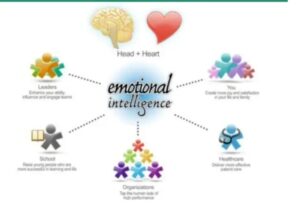There is a rule in this bustling and globalized setting for business that is seldom acknowledged but can sometimes be decisive in establishing someone’s standing among his or her colleagues. Business etiquette is another word for this code, and it extends much further than knowing which fork to use in a formal setting. Business etiquette involves the appropriate behaviors, forms of communication, and interpersonal skills that contribute to professional relationships and the general organizational culture. At its core, lies Emotional Intelligence (EI)—a potent variable that determines and supports business etiquette.
Understanding Business Etiquette: The Subtle Art
The concept of “business etiquette” is not static as it changes depending on the prevailing culture within a society at any particular time and place. Among many threads of this intricate web are punctuality, appropriate apparel, and productive emails among others, as well as the knowledge of how to communicate properly between persons in different cultures. Business etiquette, at its core, simply expresses respect, courtesy, and thoughtfulness that creates a conducive work environment.
Emotional Intelligence and Business Etiquette
The term emotional intelligence, also known as EI or EQ refers to the capacity to acknowledge, comprehend, control, and make good use of one’s own feelings together with other people’s feelings. This is one of the most complex sets of skills, which makes it very important to correct business manners. Here’s how EI affects and sustains business etiquette:
Self-Awareness: EI rests on self-awareness – identifying one’s feelings, strengths, and weaknesses. Self-awareness within the context of business etiquette makes one realize the effect of one’s behavior on fellow employees or business partners. It helps professionals point out specific aspects of their etiquette that may require improvement.
Empathy: The concept of empathy is core to EI, which means the capacity to comprehend and identify with other people’s emotional states. This concept involves metaphorically stepping into the shoes of your colleagues, customers, or partners within the business setting, signifying a shift in perspective and understanding their viewpoints. Empathy is a high-level trait that helps one to respond to people’s needs and emotional issues hence ensuring a professional code of conduct. For example, empathy can be crucial in negotiation, conflict settlement, and the provision of services to customers.
Effective Communication: Business etiquette always focuses on effective communication. With EI, you can improve communication by being clear, active listening, and thinking about other people’s opinions. It lets you express yourself appropriately, making for seamless conversations and good business relations.
Stress Management: Stress can sometimes cause people not to behave appropriately in the business world. High EI individuals are able to control their stress and emotions which help them stay calm and professional in demanding circumstances. This is essential in maintaining business linkages as well as a reputation.
Conflict Resolution: Business etiquette is challenged on most occasions during conflicts. People with high EI may enter into a conflict with an element of compassion and empathy, pursuing solutions that will be equitable for all parties involved. It also helps save relationships and sometimes may be the basis of a new creative way of solving problems.
Leadership and Team Dynamics: EI plays an important role in establishing a good standard of business conduct that leaders need to adopt. As such, high EI leaders lead to developing an environment of respect and courtesy among other things which spread across the whole organisation. They spearhead teamwork and encourage good business conduct in the organization.
Sustaining Business Etiquette through EI
The culture of business etiquette, however, should rather be a way of life that every organisation needs to instill and maintain among its staff members. However, emotional intelligence acts similarly to a cement that holds and supports business etiquette in a sustainable manner. Individuals and teams learn how to cultivate their EI as they become increasingly aware of the subtleties of business etiquette that should be applied in all offices across countries.
In conclusion, business etiquette transcends mere rule-following, as it lies at the heart of every professional interaction. The influence of Emotional Intelligence in molding and preserving business etiquette cannot be emphasized enough. Furthermore, individuals with high EI not only embody business etiquette with finesse but also have the remarkable ability to propagate it throughout their professional spheres. In a world where relationships and respect hold immense value, cultivating and spreading Emotional Intelligence, is the key to mastering the art of business etiquette.


